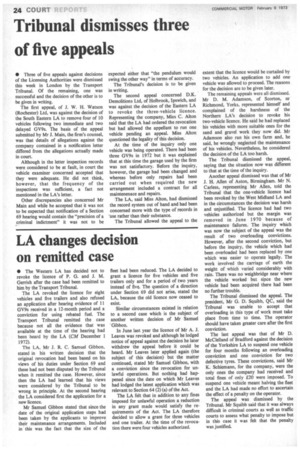Tribunal dismisses three of five appeals
Page 26

If you've noticed an error in this article please click here to report it so we can fix it.
• Three of five appeals against decisions of the Licensing Authorities were dismissed this week in London by the Transport Tribunal. Of the remaining, one was successful and the decision of the other is to be given in writing.
The first appeal, of J. W. H. Watson (Rochester) Ltd, was against the decision of the South Eastern LA to remove four of 10 vehicles following two immediate and two delayed GV9s. The basis of the appeal submitted by Mr J. Main, the firm's counsel, was that details of allegations against the company contained in a notification letter differed from the allegations actually made in court.
Although in the letter inspection records were considered to be at fault, in court the vehicle examiner concerned accepted that they were adequate. He did not think, however, that the frequency of the inspections was sufficient, a fact not mentioned in the LA's letter.
Other discrepancies also concerned Mr Main and while he accepted that it was not to be expected that notification of a Section 69 hearing would contain the "precision of a criminal indictmentit was not to be
expected either that "the pendulum would swing the other way" in terms of accuracy.
The Tribunal's decision is to be given in writing.
The second appeal concerned D.K. Demolitions Ltd, of Holbrook, Ipswich, and was against the decision of the Eastern LA to revoke the three-vehicle licence. Representing the company, Miss C. Alton said that the LA had ordered the revocation but had allowed the appellant to run one vehicle pending an appeal. Miss Alton questioned the legality of this decision.
At the time of the inquiry only one vehicle was being operated. There had been three GV9s in 1972 but it was explained that at this time the garage used by the firm was not satisfactory. Before the inquiry, however, the garage had been changed and whereas before only repairs had been carried out when required the new arrangement included a contract for all maintenenace and repairs.
The LA, said Miss Alton, had dismissed the record system out of hand and had been concerned more with the type of records in use rather than their substance.
The Tribunal allowed the appeal to the extent that the licence would be curtailed by two vehicles. An application to add one vehicle was allowed to proceed. The reasons for the decision are to be given later.
The remaining appeals were all dismissed. Mr D. M. Adamson. of Scorton, nr Richmond, Yorks, represented himself and complained of the harshness of the Northern LA's decision to revoke his two-vehicle licence. He said he had replaced his vehicles with more suitable ones for the sand and gravel work they now did. Mr Adamson also ran his own farm and, he said, he wrongly neglected the maintenance of his vehicles. Nevertheless, he considered the decision of the LA too harsh.
The Tribunal dismissed the appeal, saying that the situation now was different to that at the time of the inquiry.
Another appeal dismissed was that of Mr
J. H. Allen of Aston, Birmingham. Mr N. Carless, representing Mr Allen, told the Tribunal that the one-vehicle licence had been revoked by the West Midland LA and in the circumstances the decision was harsh and unjustified. The licence had had two vehicles authorized but the margin was removed in June 1970 because of maintenance failures. The inquiry which was now the subject of the appeal was the result of two overloading convictions. However, after the second conviction, but before the inquiry, the vehicle which had been .overloaded had been replaced by one which was easier to operate legally. The work involved the carriage of earth the weight of which varied considerably with rain. There was no weighbridge near where the vehicle worked but since the new vehicle had been acquired there had been no further trouble.
The Tribunal dismissed the appeal. The president, Mr G. D. Squibb, QC, said the Tribunal was unable to accept that overloading in this type of work must take place from time to time. The operator should have taken greater care after the first conviction.
The last appeal was that of Mr D. McClelland of Bradford against the decision of the Yorkshire LA to suspend one vehicle for four months following an overloading conviction and one conviction for two defective tyres. These convictions, said Mr K. Schiemann, for the company, were the only ones the company had received and total fines of only £20 were imposed. To suspend one vehicle meant halving the fleet and the LA had made no effort to ascertain the effect of a penalty on the operator.
The appeal was dismissed by the Tribunal. Mr Squibb said that it was always difficult in criminal courts as well as traffic courts to assess what penalty to impose but in this case it was felt that the penalty was justified.
































































































